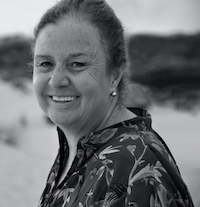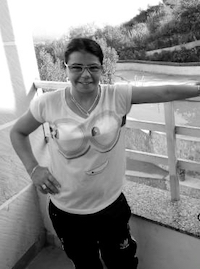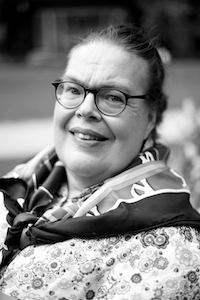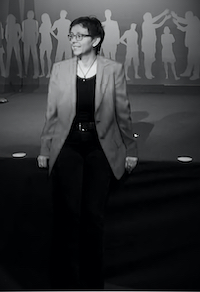On International Women´s Day 2021, EDF have discussed with some of our partners about the challenges that women and girls with disabilities have to face in COVID-19 times.
They have shared with us their reflections on the lack of an inclusive response to COVID-19 and their work giving voice to women and girls with disabilities in Europe.
Guadalupe Morales, EDF Women’s Committee (Spain)
 “Women suffer from worse medical attention due to their diagnosis, because of the stigma, that makes everything focus on the problem of mental health, not considering that it can be other problems of an exclusively medical nature. It must be guaranteed access to medical services. Not being able to have proper gynecological attention has and still have tragic consequences. That is the case of women with cancer not diagnosed on time.
“Women suffer from worse medical attention due to their diagnosis, because of the stigma, that makes everything focus on the problem of mental health, not considering that it can be other problems of an exclusively medical nature. It must be guaranteed access to medical services. Not being able to have proper gynecological attention has and still have tragic consequences. That is the case of women with cancer not diagnosed on time.
Women who are admitted to mental health facilities, not only have lose their freedom and scarcely have communication with the outside They should have adequate living facilities and have privacy. Unemployment has increased dramatically in women with psychosocial disabilities; it is the higher of the whole population.
Women with psychosocial disability are denied their rights constantly as citizens. We are not equal in access to justice. Too often loose the custody of their children, because stigma and lack of knowledge of the judicial system
Basque Federation of Family and persons with Mental Health problems, published in 2017 a study about women with mental health problems and violence.
Extremely high rate of sexual violence against women. Eight out of ten women with mental illness, suffer abuse from their partner. Basque Federation of Family and persons with Mental Health problems, published in 2017 a study about women with mental health problems and violence.”
Jenny Nilsson, EDF Women’s Committee (Sweden)
 “In the COVID-19 crisis, we see that in some challenges which have gotten worse. I am deeply worried that many women with disabilities will and are facing domestic and sexual violence and they will struggle even more to access the services they need.
“In the COVID-19 crisis, we see that in some challenges which have gotten worse. I am deeply worried that many women with disabilities will and are facing domestic and sexual violence and they will struggle even more to access the services they need.
With the COVID-19 crisis we see how important it is to always be present and raising our voices in the front. We do not really know what will happen in the next. I truly never imagined a world where we have had city lockdowns everywhere. Otherwise, the COVID-19 also created creative opportunities where women with disabilities came together through flexible digital meetings.”
Luminita Caldaras, Inclusion Europe (Romania)

“In my opinion, women with disabilities (especially intellectual disabilities) find it more difficult to understand and comply with certain restrictions and protective measures against COVID-19. They may also find it more difficult to receive medical care if they become ill. I think that medical staff is not sufficient or sufficiently trained to meet the needs of people with intellectual disabilities.
It is important to advocate for the rights of women and girls with disabilities to ensure their integration into society. So that they have the necessary support and are not longer discriminated against. They deserve to have a normal life, like everyone else.”

“Living with disability in this time of restrictions, facing loss of income, loss of essential services, such as personal assistance or rehabilitation or other health and social services. Loss of social connections, meeting your loved ones. problems in distance learning and education support are particularly acute for girls with disabilities. Many still have to live in institutions which create specific risks, such as violence against women with disabilities.
So many women and girls 1 in 5 lives with a disability, and many of the risks, including violence against women and girls either in institutions or domestic violence are very close to them. Meanwhile, the support networks are not always easily accessible for women and girls. They must be empowered to participate fully in their community, including political life, so that society welcomes them as full and equal members. If women are involved in the decision-making, our communities can become stronger and more sustainable for all.”
Photo credit: © Sarah Halls Photography & Videography Ltd.
Sanja Tarczay, President of the European Deafblind Union (Croatia)

“All persons with disabilities are facing many challenges due to COVID-19epidemic as well the deafblind persons in general are facing everyday discrimination, but deafblind women and girls have to fight with multiple discrimination due to their gender as well. While they are facing „fourfold discrimination“ based on their gender, disability, sensory deprivation and socio-economic exclusion. Women with disabilities and deafblind women who are fighting for women’s rights are very often discriminated from other women themselves. What we are witnessing during the COVID-19 epidemic is that they are more exposed to the physical, emotional and sexual violence. Finally, due to the COVID- restrictions such as wearing masks and keeping distance, deafblind women and girls on top of everything have to fight to gain access to information, communication, mobility and social interactions as the interpreting service is restricted to the “emergency situations” in most countries while deafblind persons are left in isolation.
The advocating is now more important than ever since the government responses due to the COVID-19 such as keeping social distance and wearing masks must consider persons with deafblindness on an equal basis with others. Moreover, deafblind women and girls are still in need for a Deafblind interpreter to help them to get all necessary instructions and information when they do not have family support or where alternative communication methods have failed, therefore, it is vital that our unique disability is treated with respect under such restrictions.
That is why national DPOs representing persons with disabilities, therefore women and girls with disabilities need to make sure to continue with providing of their social services like Deafblind interpreting services for persons with deafblindness. Moreover,
The vital task is to make sure that the most isolated deafblind women and girls receive information on time and that they have prioritized access to food and medicines. Finally,
among our top priorities should be to work on the awareness and recognition of women and girls with disabilities, for deafblind persons that is red-white cane that is still not officially recognised in many EU countries so we have to work on that as well.”